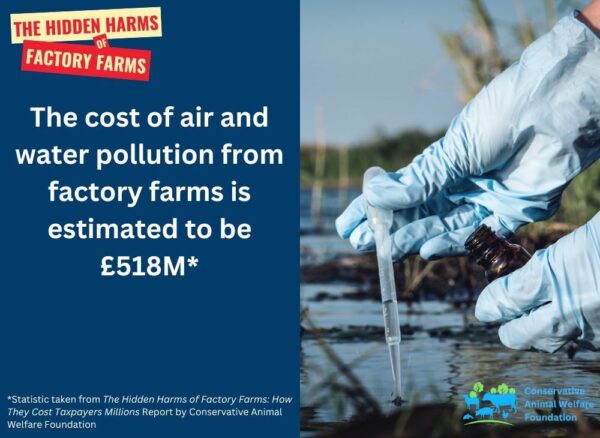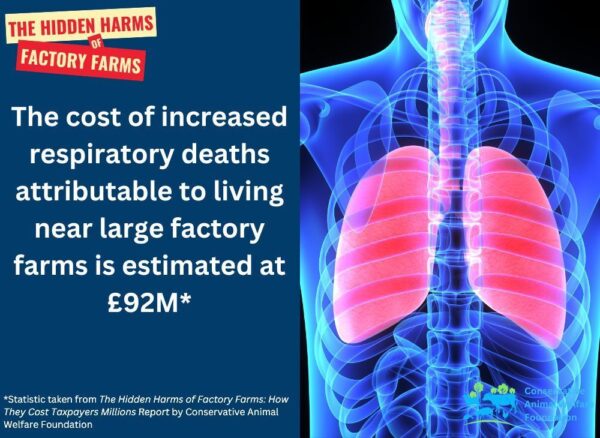The Conservative Animal Welfare Foundation (CAWF) has published a landmark new report revealing the hidden costs of factory farms to the UK taxpayer – using publicly available UK Government data and an original survey of over 1,000 UK residents. The research was conducted by Bryant Research.
At a time when small farms face immense pressure and mounting challenges, our report highlights how factory farms pose a further threat to their survival. Over the past decade, small family farms in the UK have been increasingly replaced by fewer, larger facilities housing tens of thousands of animals in intensive conditions – commonly referred to as factory farms. While these industrial facilities claim to deliver cheap meat and improved food security, the reality is far more complex.
The report reveals that the true costs of factory farming extend far beyond the supermarket checkout. Many of these hidden costs undermine food security rather than bolstering it, adding significant financial burdens to taxpayers.
The report estimates the total amount of costs to the UK taxpayer to be over £1.2 billion annually. This includes:
1. Subsidies: We estimate 85% of subsidies that go to chicken and pig farmers are consumed by factory farms, amounting to £269M a year.
2. Environmental Pollution: The cost of air and water pollution from factory farms is estimated to be £518M.
3. Public Health Problems: The cost of increased respiratory deaths attributable to living near large factory farms is estimated at £92M.
4. Lost Farming Jobs: We estimate that factory farms have destroyed 14,000 farming jobs with annual salaries not paid valued at £333M.
Furthermore, the report found little evidence that factory farms make products significantly cheaper, nor that they increase food security. On the contrary, factory farms have increased hidden costs, soaking up taxpayer money through subsidies, imposed significant costs to the environment, public health and destroyed thousands of farming jobs.
Lord Zac Goldsmith commented: “Over the past decade, increasing numbers of small family farms in the UK have been replaced by larger facilities housing tens of thousands of animals at a time in intensive conditions. While these industrial farms claim to provide cheap meat and improved food security, the reality is far more complex. There are hidden costs, like environmental damage, public health issues, antibiotic resistance and job losses—all of which undermine food security, jeopardise our health and burden taxpayers. This report challenges the most basic justifications for factory farming”
Conservative Animal Welfare Foundation urges policymakers to consider the impact of the £1.2 billion paid through hidden costs, and restructure incentives to move towards a more sustainable food production system which benefits all stakeholders, including consumers, farms and local communities.
Key recommendations from the report include not allowing building or expansion of new megafarm facilities, especially in areas vulnerable to river pollution, to restructure subsidies to reward smaller-scale farmers who grow healthier and more environmentally friendly foods, to engage in open transparency and communication of how the subsidy system is restructured and to limit the ability of factory farms to use taxpayer subsidies to export cheap meat, ensuring subsidies only enhance UK food security.
Sir Roger Gale MP commented: “This powerful report reveals the unsavoury costs of factory farming and the wholly unacceptable extent which these unsustainable industrialised systems are impacting our small farmers, our environment, our health, our public wallet and our national food security. We need urgent reform to address our evidently failing food system and to move towards more sustainable and ethical farming practices.”

The report also recommends that DEFRA should implement monitoring and restriction of the number of “zero grazing” cattle systems in the UK, and that DEFRA should also monitor animal agriculture jobs specifically, by farm type and animal, allowing direct assessment of the impact of industrial animal agriculture on farming jobs.
Lorraine Platt, Co-Founder of Conservative Animal Welfare Foundation, commented:
“Our report published today offers a stark and illuminating spotlight on the true costs of intensive, large-scale factory farming -costs that extend far beyond the supermarket checkout. It dismantles readily-accepted justifications for these unsustainable and harmful industrial operations, which have increasingly dominated the farming landscape in recent years.
There is a pressing need for transformative changes to the food current food system. Factory farms represent a failing model which is not only letting down our small farmers, but also inflicts significant harm to food security, public health, the environment and the taxpayer wallet.”

Our Co-Founder’s article in Comment Central on our report can be found here.


